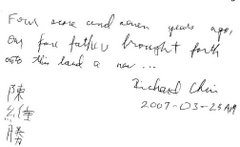I have been seeing a local neurologist for years. He diagnosed my ataxia and completed the disability paperwork. He is very competent and compassionate but I am the only ataxia patient in his practice. That's one of the down sides of ataxia; it is so relatively rare that even specialists have hardly ever come across it. When it came to symptomatic treatment, I mostly drew blanks. Conversely, I have started to see Dr. Susan Perlman of UCLA late last year. In contrast, she is not a stranger to ataxia. Aside from being an acknowledged expert in the field, she has literally seen hundreds of patients with ataxia in her practice. She recommended a slew of medications and supplements that addressed my various symptoms ranging from swallowing and choking, slurred speech, fatigue and balance. I have experienced noticeable improvements in all of these areas since.
We just returned from a visit last week to see Dr. Perlman - for a "before" China visit. Within a month of returning, the plan is an "after" China visit. Dr. Perlman has been very interested in the goings on in China. She also described what might be reasonable goals for me after the stem cell treatment. Specifically, I would want to look for an improvement in upright standing/walking as well as an improvement in the neuropathy afflicting my feet ( a loss of peripheral sensation). I also suffer from horizontal nystagmus and double vision. However, I do not expect it to improve enough to drive again (which I stopped 1.5 years ago).
For ataxia, it is unlikely that stem cell treatment alone will be a permanent cure since the root cause of the disease isn't really addressed. The solution is the ability to alter the genetics of the afflicted. I like to think that is the work of Nobel prizes (one of which was recently awarded to Dr. Roger Kornberg for his work on genetic transcription) and a lot of subsequent clinical follow-up. The downside ... there is little attention for such a rare disease like ataxia. The upside ... ataxia shares many of the same traits and treatments as Huntington's and Parkinson's Diseases which do get more attention.
Subscribe to:
Post Comments (Atom)



2 comments:
Richard,
Do you or Lily speak any Mandarin? If Lily is from Hong Kong (so is Grace, the head Beike girl) she probably knows Cantonese, which will get you by. The language barrier was the biggest problem. Take plenty of Ibuprofen or Aspirin. It's impossible to find in China.
Kim Poor
Kim,
In terms of language "fluency" Lily does speak both Mandarin and Cantonese. I only marginally speak some Cantonese. Hopefully, I 'll be able to find Lily when I need her.
We were aware of your comments about OTC pain killers. We intend to bring some along. If Lily finds a local source, we'll definitely mention it in a subsequent blog entry.
T-9 and counting.
- Richard
Post a Comment